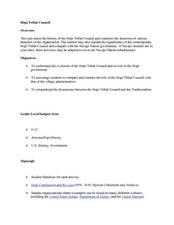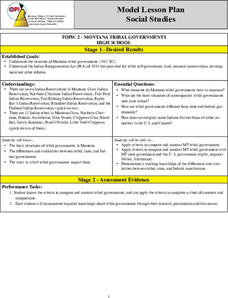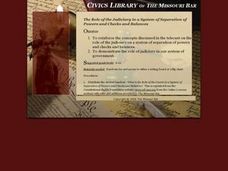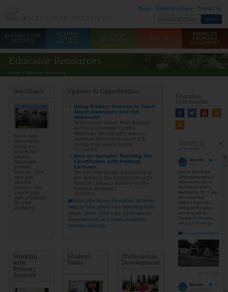iCivics
Congress
Through reading materials, worksheets, and a primary source activity, this resource provides an overview of the structure and powers of the legislative branch of government in the United States. Readings review how a bill becomes a law,...
Street Law
The Challenge of Selecting an Ideal Supreme Court Nominee
Nearly every president has had the opportunity to name a nominee to the United States Supreme Court. But what makes someone an ideal candidate to become a Supreme Court justice? High schoolers test their prior knowledge about the Supreme...
Curated OER
Charting the Three Branches of Government
Learners review CongressLink on the internet and study the branches of government. They work in groups to create charts showing the structure and functions of the three branches of government as outlined in the first three articles to...
Council for Economic Education
The Role of Government: The Federal Government and Fiscal Policy
Give learners a crash course in balancing the books on the United States federal government level with an economics and government resource. Class members engage in a warm-up discussion and brainstorming session before answering...
Curated OER
Structure and Function of the Federal Government
Students identify the structures of the federal government. They complete a diagram of the structures to show their relationships. They research the names of the major players on the structure, in particular, students own representatives.
Curated OER
Hopi Tribal Council
Focusing on the differences between traditional Hopi government and the Hopi Tribal Council, this resource is a good addition to your unit on Native American culture. Learners conduct Internet research, analyze primary source photos, and...
Ohio Center For Law-Related Education
Four Activities: Thurgood Marshall and the Nomination and Confirmation of Federal Judges
The process of nominating and confirming federal judges can sound like a lot of bureaucratic hoops, but a resource breaks down the steps of the Supreme Court nominations in a simpler manner. Learners participate in four activities that...
Curated OER
Follow a Bill!
Students discover how a bill becomes a law. In this Legislative Branch lesson, students watch C-Span coverage of a bill making its way through the House and the Senate. Students use the provided worksheet to chart the progress of the bill.
Curated OER
Indiana Courts: How Do They Work?
Students identify the branches of Indiana's judicial system and determine the differences between the different courts and different types of cases. Students create a flow chart showing how a court case works its way through the legal...
Curated OER
Montana Tribal Governments
High schoolers engage in a research lesson to find out more information about tribal governments. The lesson includes guiding questions to help in the research process. They complete a chart of comparisons and contrasts of several indian...
National Endowment for the Humanities
James Madison: Madison Was There
Madison was there! Scholars go on a journey to discover the person behind the founding father label as they explore James Madison's role in the formation of the United States government. The culmination is a writing assignment and...
Curated OER
RESPONSIBILITIES OF OFFICE
Learners make an organizational chart. They show the relationship of power in the executive branch of the Illinois state government. They include the responsibilities of each office and define the roles and responsibilities of top...
Curated OER
Term Limits: When is Enough?
Learners discuss the issue of term limits in the executive and legislative branches. They research the issue and create a pros and cons chart with the various opinions on Congressional term limits. In addition, they explore the 22nd...
Curated OER
Law, Values and Lobbying
Young scholars begin to examine the lawmaking process. Using their text, they describe the role of the three branches of government. In groups, they identify the four basic values protected by law and define the concept of lobbying and...
Curated OER
Stepping Inside the Flowchart: How Does a Bill Become a Law?
Students explore the steps a bill must pass through to become a law and create a flow chart that maps the complexities of the process. They research the committees that are involved in a bill that relates to energy policy and the...
Curated OER
The Role of the Judiciary in a System of Separation of Powers and Checks and Balances
Students review concepts shown to them in a telecast on the role of the judiciary in a system of separation of powers. After reading an article, they work together in groups to complete a chart on checks and balances. They also discuss...
Curated OER
Civics: State Vs. Rowe
Students examine the case of State vs. Rowe to discover the duties of the three branches of government. They explore the concepts of separation of powers and checks and balances to assess how they apply to an actual situation.
Curated OER
Government: Missouri Bar Civics Library
Learners visit the Missouri bar Website to examine information about the U.S. Constitution and its Amendments. They complete a variety of activities from the provided lessons including the judiciary, Fourth Amendment issues, civil law,...
Curated OER
Constitutional Issues: Separation of Powers
Students discribe the principle and the history of separation of powers.




















